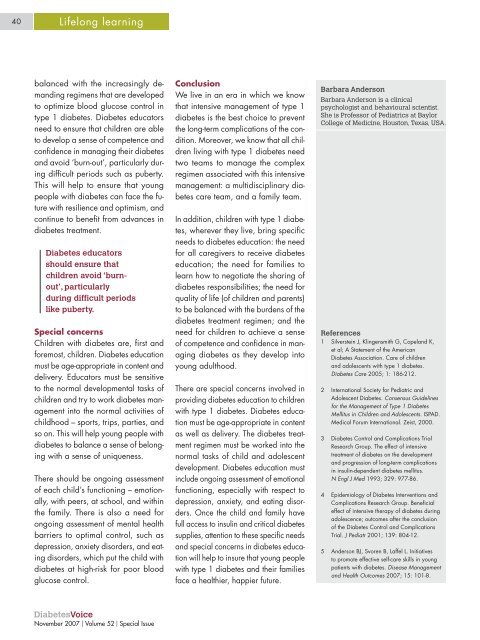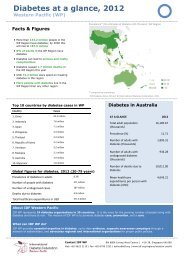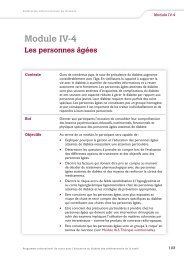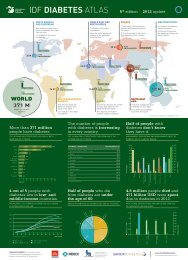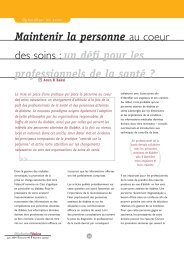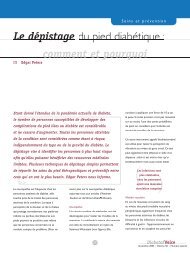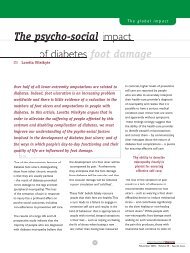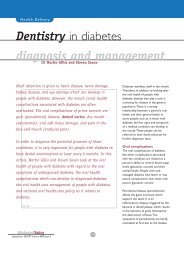Diabetes education - International Diabetes Federation
Diabetes education - International Diabetes Federation
Diabetes education - International Diabetes Federation
You also want an ePaper? Increase the reach of your titles
YUMPU automatically turns print PDFs into web optimized ePapers that Google loves.
40<br />
Lifelong learning<br />
balanced with the increasingly demanding<br />
regimens that are developed<br />
to optimize blood glucose control in<br />
type 1 diabetes. <strong>Diabetes</strong> educators<br />
need to ensure that children are able<br />
to develop a sense of competence and<br />
confidence in managing their diabetes<br />
and avoid ‘burn-out’, particularly during<br />
difficult periods such as puberty.<br />
This will help to ensure that young<br />
people with diabetes can face the future<br />
with resilience and optimism, and<br />
continue to benefit from advances in<br />
diabetes treatment.<br />
<strong>Diabetes</strong> educators<br />
should ensure that<br />
children avoid ‘burnout’,<br />
particularly<br />
during difficult periods<br />
like puberty.<br />
Special concerns<br />
Children with diabetes are, first and<br />
foremost, children. <strong>Diabetes</strong> <strong>education</strong><br />
must be age-appropriate in content and<br />
delivery. Educators must be sensitive<br />
to the normal developmental tasks of<br />
children and try to work diabetes management<br />
into the normal activities of<br />
childhood – sports, trips, parties, and<br />
so on. This will help young people with<br />
diabetes to balance a sense of belonging<br />
with a sense of uniqueness.<br />
There should be ongoing assessment<br />
of each child’s functioning – emotionally,<br />
with peers, at school, and within<br />
the family. There is also a need for<br />
ongoing assessment of mental health<br />
barriers to optimal control, such as<br />
depression, anxiety disorders, and eating<br />
disorders, which put the child with<br />
diabetes at high-risk for poor blood<br />
glucose control.<br />
Conclusion<br />
We live in an era in which we know<br />
that intensive management of type 1<br />
diabetes is the best choice to prevent<br />
the long-term complications of the condition.<br />
Moreover, we know that all children<br />
living with type 1 diabetes need<br />
two teams to manage the complex<br />
regimen associated with this intensive<br />
management: a multidisciplinary diabetes<br />
care team, and a family team.<br />
In addition, children with type 1 diabetes,<br />
wherever they live, bring specific<br />
needs to diabetes <strong>education</strong>: the need<br />
for all caregivers to receive diabetes<br />
<strong>education</strong>; the need for families to<br />
learn how to negotiate the sharing of<br />
diabetes responsibilities; the need for<br />
quality of life (of children and parents)<br />
to be balanced with the burdens of the<br />
diabetes treatment regimen; and the<br />
need for children to achieve a sense<br />
of competence and confidence in managing<br />
diabetes as they develop into<br />
young adulthood.<br />
There are special concerns involved in<br />
providing diabetes <strong>education</strong> to children<br />
with type 1 diabetes. <strong>Diabetes</strong> <strong>education</strong><br />
must be age-appropriate in content<br />
as well as delivery. The diabetes treatment<br />
regimen must be worked into the<br />
normal tasks of child and adolescent<br />
development. <strong>Diabetes</strong> <strong>education</strong> must<br />
include ongoing assessment of emotional<br />
functioning, especially with respect to<br />
depression, anxiety, and eating disorders.<br />
Once the child and family have<br />
full access to insulin and critical diabetes<br />
supplies, attention to these specific needs<br />
and special concerns in diabetes <strong>education</strong><br />
will help to insure that young people<br />
with type 1 diabetes and their families<br />
face a healthier, happier future.<br />
Barbara Anderson<br />
Barbara Anderson is a clinical<br />
psychologist and behavioural scientist.<br />
She is Professor of Pediatrics at Baylor<br />
College of Medicine, Houston, Texas, USA.<br />
References<br />
1 Silverstein J, Klingensmith G, Copeland K,<br />
et al; A Statement of the American<br />
<strong>Diabetes</strong> Association. Care of children<br />
and adolescents with type 1 diabetes.<br />
<strong>Diabetes</strong> Care 2005; 1: 186-212.<br />
2 <strong>International</strong> Society for Pediatric and<br />
Adolescent <strong>Diabetes</strong>. Consensus Guidelines<br />
for the Management of Type 1 <strong>Diabetes</strong><br />
Mellitus in Children and Adolescents. ISPAD.<br />
Medical Forum <strong>International</strong>. Zeist, 2000.<br />
3 <strong>Diabetes</strong> Control and Complications Trial<br />
Research Group. The effect of intensive<br />
treatment of diabetes on the development<br />
and progression of long-term complications<br />
in insulin-dependent diabetes mellitus.<br />
N Engl J Med 1993; 329: 977-86.<br />
4 Epidemiology of <strong>Diabetes</strong> Interventions and<br />
Complications Research Group. Beneficial<br />
effect of intensive therapy of diabetes during<br />
adolescence; outcomes after the conclusion<br />
of the <strong>Diabetes</strong> Control and Complications<br />
Trial. J Pediatr 2001; 139: 804-12.<br />
5 Anderson BJ, Svoren B, Laffel L. Initiatives<br />
to promote effective self-care skills in young<br />
patients with diabetes. Disease Management<br />
and Health Outcomes 2007; 15: 101-8.<br />
November 2007 | Volume 52 | Special Issue


